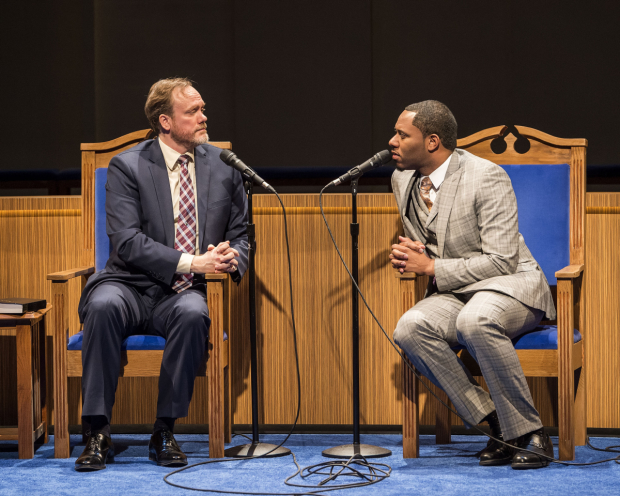The Christians
Religious zealousness is pondered in this provocative drama at the Mark Taper Forum.

(© Craig Schwartz)
Religion can be a great separator. Though it can bind people together, it can also create an us-vs.-them mentality. In The Christians playwright Lucas Hnath lights a charge in his audience by confronting head-on the dangers of absolute faith, particularly when that belief excludes others viewpoints. Hnath gives the audience much to contemplate in his play, but he muddies the water by leaving them unclear about what exactly he is advocating.
Pastor Paul (Andrew Garman) has had an epiphany, and his Sunday morning sermon to his congregation reflects that change in faith. At a conference, he heard the story of a boy running into a fire to save his sister. After the boy died of burns, the local Christian missionary acknowledged that the boy would go to hell, despite his heroism and selflessness, because he did not accept Christ as his savior. Being a devout Christian, Pastor Paul had always preached this dogma. However, this story rips him apart and he believes that God now wants him to change the church's views and accept that there is neither a devil nor a hell in the afterlife. The congregation is shocked by their esteemed leader's rejection of this tenet, which many of the parishioners believe keeps people on the righteous path. Some react immediately, like the more evangelical associate pastor Joshua (Larry Powell), while others turn against Paul over time.
It is clear that Paul has rocked the church to its foundation, but author Hnath keeps it hazy whether he made a tough, but smart, decision or was a fool all along. That ambiguity in itself would not be problematic, since it allows the audience to resolve in their minds Pastor Paul's motivations, and Hnath paints with enough grays, not only with Paul's characterization but the other congregants as well. Unfortunately, Hnath does not give the audience enough information to examine the characters fully. Whether you believe in hell or not, chances are you're are not going to have your mind altered by this play and its lack of palpable drama.
Director Les Waters makes the audience feel like active participants in the play by converting the Mark Taper Forum into a church. Flat lighting by Ben Stanton and a set by Dane Laffrey that replicates the grand churches of Pat Robertson and Jerry Falwell gives the illusion that the audience is the church's congregation. The fantasy works as quite a few members reacted as if they were congregants, even shouting a "Hallelujah" in reaction to a character's dialogue.
Waters' conceit of the play being an on-going service becomes a trap, however. The characters never leave the pulpit. Their conversations are either narrated by Paul or shown as interior monologues, which strips the play of its drama, particularly when heated arguments break out. The audience never believes they are watching events unfold, but are instead viewing them afterward. Additionally, the actors whipping of microphone cords about to further emphasize their dialogue and feelings becomes tiring.
Garman is compelling as the pastor taking a risk. His character's concerns feel genuine, and he lends a folksiness to his persona. Larry Powell is frighteningly tense as junior pastor. Spiteful, condescending, but unwavering in his faith, he comes off as a bully who nonetheless trusts everything he moralizes. Emily Donahoe, as a mousy but confused choir member, illustrates the rage and obstinacy one feels when their foundation has been stripped away. Linda Powell, as Paul's wife, is given little to do in the play. She remains quiet in her chair for three-quarters of the show. When her character does confront her husband near the end, the audience hasn't invested in her character enough to see her as anything but a cold zealot. A choir behind the actors brings flavor to the church setting, but could have been better utilized to comment on the situations.
The Christians wants to discuss the precariousness of religion, which is important in an age where religious freedom is being touted as an excuse to hate and discriminate. Unfortunately, by clinging to a concept that feels clever but superficial and stiff, The Christians only quietly steps away from the fight it has started.











